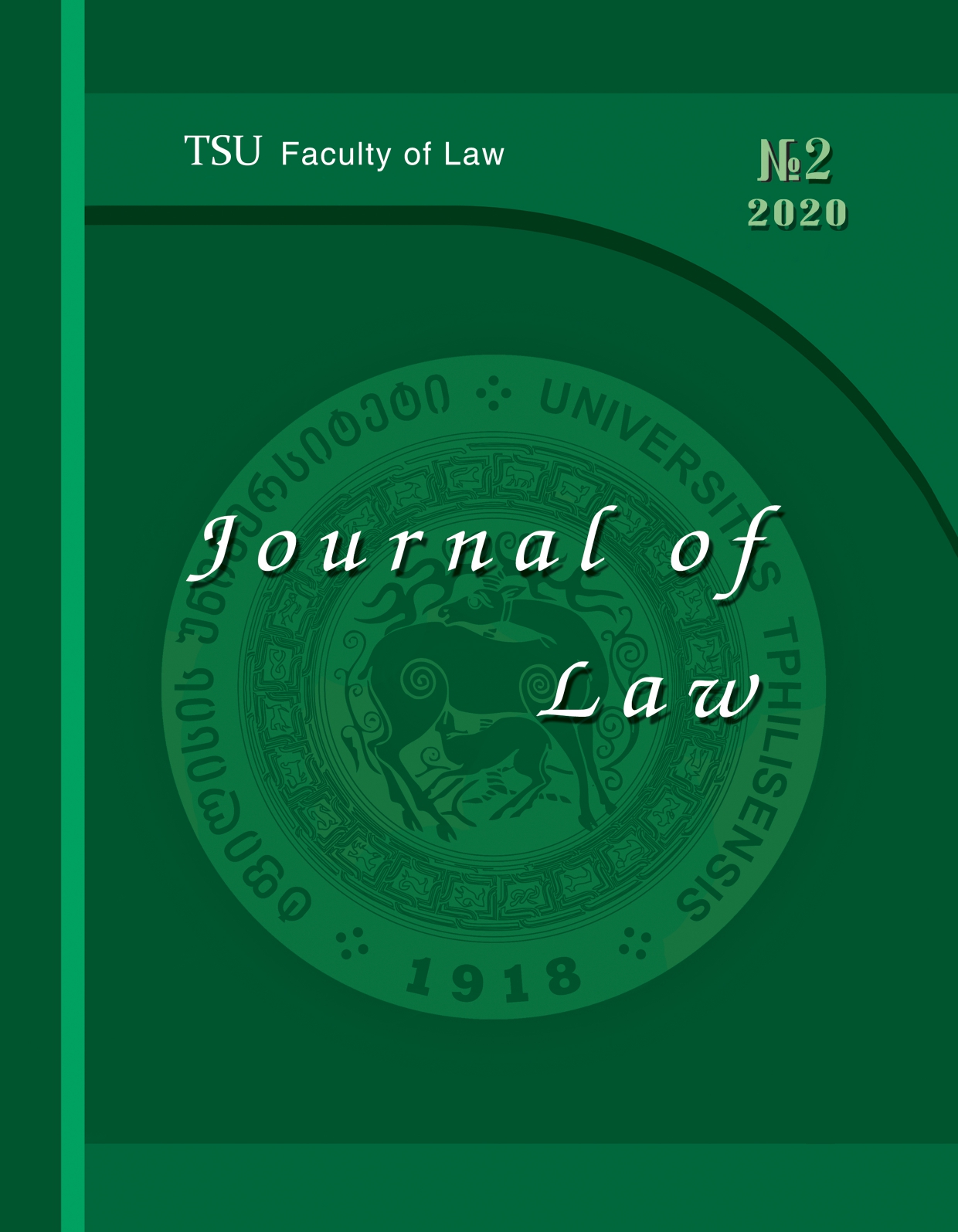Fraud Prevention According to Tore Bjorgo Model
DOI:
https://doi.org/10.48614/jlaw.2.2020.230-245Keywords:
fraud, crime prevention, fraud prevention, crime control, crime, Criminal Code of Georgia, potential criminal, punishments, re-socialization, rehabilitation, crime victim.Abstract
Fraud related crimes are rather common in Georgia. The proof of this is the official statistics of the Ministry of Internal Affairs of Georgia.[1] Thus, it is a priority for the state and society to combat and prevent fraud. This article studies fraud prevention according to Tore Bjorgo crime prevention model. This model is holistic and looks at crime prevention actions from different angles. Along with the theoretical materials this work studies court decisions in force and determines practical actions based on them. In the process of fighting fraud an active involvement of law enforcement agencies, society and individuals is essential. Fraud being a crime based on deception is a threat which citizens need to be better informed of. In line with the economic development of a country criminal law policy and action plan have to be established to ensure the desired result, crime prevention and control.
[1] Official statistics of Ministry of Internal Affairs, https://info.police.ge/page?id=115 [26.10.2020].
References
Edict of the President of code dated March 22, 2012 № 235.
Akers R. L., Sellers C. S., Jennings W. G, Criminological Theories, Introduction, Evaluation, and Application, USA, New York., 2017, 2-6.
Albrecht W. S., Albrecht C. O., Albrecht C. C., Zimbelman M. F., Fraud Examination, 4th ed., USA, Mason OH, 2012, 13-14.
Barkan S. E., Criminology, A Social Understanding, USA, New Jersey, 2009, 462-463.
Brightman H. J., Today’s White Collar Crime, Legal, Investigative, and Theoretical Perspectives, USA, New York., 2009, 265.
Bekaria Ch., For Crime and Punishment, Tbilisi, 2003, 197-200 (in Georgian).
Boilke V., Wessels I., General Part of Criminal Law, Dvalidze I. (ed.), Tbilisi, 2010, 48 (in Georgian).
Bjorgo T., Crime Prevention. Holistic Approach, Bakhtadze U. (trans.), Giorgadze G., Shalikashvili M. (eds.), Tbilisi, 2016, 23-25, 34-40, 52-53, 72-81, 93 (in Georgian).
Bragg S. M., Fraud Examination, Prevention, Detection, and Investigation, 2nd ed., USA, Colorado, 2019, 85-88, 94-96.
Clarke V. R., Situational Crime Prevention, Theory and Practice. British Journal Of Criminology, 1980, 20/2, 136-147.
Chabashvili M., Dictionary of Foreign Words, Tbilisi, 1989, 275 (in Georgian).
Daigle L. E., Victimology, 2nd ed., USA, California, 2020, 32-33.
Dvalidze I., General Part of Criminal Law, Sentence and Other Criminal Consequences of Crime, Tbilisi, 2013, 14-25, 26-29 (in Georgian).
Gabunia M., Introduction to Criminology, Tbilisi, 2011, 13-17 (in Georgian).
Gakhokidze J., Gabunia M., Criminology, Tbilisi, 2012, 93-95 (in Georgian).
Ghlonti G. and Collective authors, Criminology and Legal System in Georgia, Tbilisi, 2008, 107-110 (in Georgian).
Hughes G., Understanding Crime Prevention, UK, Oxford, 2002, 8-10.
Ivanidze M. and Collective of Authors., General Part of Criminal Law, Tbilisi, 2007, 38 (in Georgian).
Khubua G., Theory of Law, Tbilisi, 2004, 46 (in Georgian).
Khuroshvili G., General Part of Criminal Law, Collective Authors, Tbilisi, 2007, 120-121 (in Georgian).
Krancher M., Riley R. A. (Dick), Wells J. T., Forensic Accounting and Fraud Examination, USA, Hoboken, New Jersey, 2011, 58-59.
Lekveishvili M., Private Criminal Law Part I (Commentary), Author Collective, Tbilisi, 2012, 382-384 (in Georgian).
Lab S. P., Crime Prevention, Lexisnexis, 2010, 26, 192-195, 271.
Mamulashvili G. and Collective Authors, Private Criminal Law Part II , Commentary, Tbilisi, 2012, 195 (in Georgian).
Mackey D. A., Levan K., Crime Prevention, USA, Burlington, Massachusetts, 2013, 31, 166-167.
Nachkebia G., On the issue of a person's criminal relation with the state, journal ‘Person and the Constitution’, № 4, 2004, 116 (in Georgian).
Newton K., Trust, Social Capital, Civil Society, and Democracy, International Political Science Review, Vol. 22, 2, 2001, 201-214, 205.
Reid. M. J., The Psychology Of Stalking, Clinical and Forensic Perspectives, USA, California, 1998, 114-117.
Shalikashvili M., Victimology, Tbilisi, 2011, 37 (in Georgian).
Shalikashvili M., Mikanadze G., Khasia M., Penitentiary Law, Tbilisi, 2014, 9 (in Georgian).
Shalikashvili M., Criminology, 3rd edition, Tbilisi, 2017, 181-182, 185 (in Georgian).
Shalikashvili M., Criminal, Criminological and Psychological Aspects of Juvenile Diversion and Mediation, Tbilisi, 2010, 3-6 (in Georgian).
Schneider S., Crime Prevention, Theory and Practice, 2nd ed., USA, Philadelphia, 2020, 5-8.
Singh D. J., Internet Scams and Fraud, USA, Utah, 2014, 1-6.
Walsh A., Ellis L., Criminology, an Interdisciplinary Approach, USA, Thousand Oaks California, 2007, 82, 174-175.
Judgment of the Tbilisi City Court, Criminal Cases, Investigative, Pretrial and Merit Panel of December 14, 2018 № 1/5353-16.
Judgment № 1/1230-18 of the Criminal Cases, Investigative, Pretrial and Merit Panel of Tbilisi City Court of April 7, 2020.
Judgment of the Criminal Cases, Investigative, Pretrial and Merit Panel of Tbilisi City Court of October 23, 2018 № 1/4607-18.
Judgment of the Criminal Cases Panel of Tbilisi City Court of August 2, 2016 № 1-56-16.
Judgment of the Criminal Cases Panel of Tbilisi City Court of April 18, 2017 № 1/4178-16.
Judgment of the Criminal Investigative, Pretrial and Merit Panel of the Tbilisi City Court of December 21, 2018 № 1 / 39-15.
Judgment of the Criminal Cases Panel of Batumi City Court of September 15, 2017 № 1/1510/14.
Official Statistics of the Ministry of Internal Affairs of Georgia, https://info.police.ge/page?id=115 [26.10.2020].
Downloads
Published
How to Cite
Issue
Section
License

This work is licensed under a Creative Commons Attribution-ShareAlike 4.0 International License.









